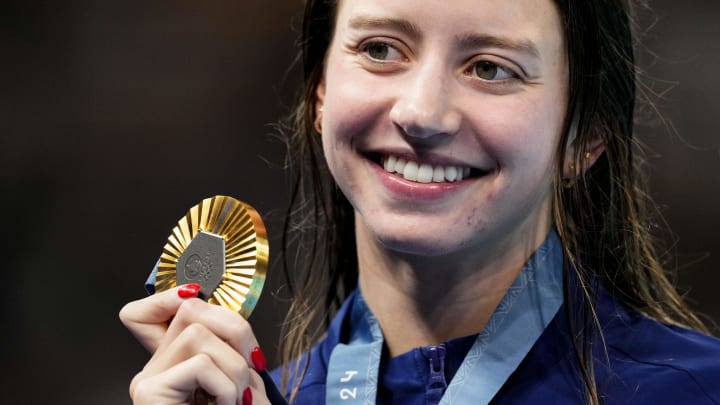Kate Douglass Delivers Much-Needed Gold Medal for U.S. Swimming

PARIS — Team Silver needed a golden girl, and here came Kate the Great Douglass to the rescue.
Understated in temperament, underrated in toughness, impeccable in technique, Douglass was the hero America wanted and needed in the pool at these Paris Olympics. Her long-gliding breaststroke is so gorgeous that it looks effortless and might even feel that way at times—“It’s kind of just relaxing sometimes,” she said—but winning the 200-meter breaststroke Thursday was hardly soft stuff.
Douglass walked clear-eyed into an alley fight with South African Tatjana Smith, the reigning gold medalist in the event and the winner in the 100 breast earlier this week. She walked away with a victory by .36 seconds, breaking her own American record and giving Team USA a jolt of adrenaline.
The top step of the medal podium has been a difficult place for the traditionally dominant U.S. swimmers to reach in Paris, with just three gold medals through the first five days of swimming competition. A fistful of silver (10 of them in swimming at the moment) is a fine accomplishment, but the U.S. is accustomed to doing a little better than fine. The bar has been set extremely high by previous generations.
The men’s 400 freestyle relay cleared the bar on the first night. Torri Huske surprisingly sailed over it in the 100 butterfly. Katie Ledecky soared past it for the eighth time in her legendary career in the 1,500 freestyle. But that was it.
A number of close races went the wrong way, and the Greatness Roadblock created by Frenchman Léon Marchand, Canadian Summer McIntosh and a whole host of Aussie women kept the “Star Spangled Banner” out of heavy rotation at La Défense Arena. They were keeping the cowbell quiet, to the delight of Aussie trash talker Cate Campbell.
Very few of the results were particularly shocking to people who were paying attention before the Olympics. This was always going to be a tough battle against an improving world. But America’s inability to hit some of the customary high notes created angst at home.
This was angst that Douglass and her teammates have tried to tune out.
“That’s sort of all the outside noise,” she said. “The mood is great, the vibes are great. We’re very proud of ourselves and proud of how we’ve done.”
Whether Douglass felt it or not, a lot of pent-up American enthusiasm was riding on her in this event. But she’s been handling increasing expectations with poise all year, since first breaking the American record in the 200 breast in January.
USA Swimming put her larger-than-life face on the side of Lucas Oil Stadium for Olympic Trials—not Ledecky, not Caeleb Dressel, but the 22-year-old with a single Olympic bronze medal to her name. That was a lot to live up to. Douglass handled that with aplomb, winning three events in Indianapolis to back up the billing.
The ultra-versatile Douglass chose to drop the 100 freestyle from her program here—in part because she wanted to pour her focus into the 200 breast and 200 individual medley (which starts Friday), plus a full relay load.
“That’s part of the reason why I dropped the 100 free, because winning the 200 breaststroke has been a goal for a few months now,” she said.
She tends to achieve her goals. Douglass’ career ascension has been extraordinary but orderly, a steady build that took her to college stardom and a breakthrough Olympic bid to Tokyo and then eventually to this big role.
She’s “definitely a numbers person,” with a degree in statistics from Virginia, and her approach to excelling at the 200 breaststroke has been numbers-based. She routinely counts her strokes per lap in practice (“kind of subconsciously”) and has found with coach Todd DeSorbo that when she can swim a 200 breaststroke in 2:19, the stroke count is the same.
She hit the stroke count Thursday night, edging away from Smith in the final 50 meters and then holding on through the final strokes. The result was a new best time (and new American record) of 2:19.24.
And clearly, swimming best times has been a difficult trick here in Paris. The Slow Pool discussion has sucked up a lot of oxygen as some big names have crashed and burned. But Douglass was impervious to all of that here, an outlier in performance.
If she can roll another best time in the 200 IM—or even come close to it—she will be in the medal mix again. Winning will be difficult with McIntosh and Australia’s Kaylee McKeown in play, not to mention American teammate Alex Walsh. But Douglass’ quiet strength is dangerous to underestimate.
She kept a stoic face on the medal stand during the national anthem but did allow herself plenty of smiles on the medal walk around the arena. That included a big embrace with her parents, Allison and William, and two younger siblings, Abby and Will. And then there were the gangs of friends from the family’s hometown of Pelham, N.Y., and Virginia. Douglass got to see a lot of them briefly on her way out to the arena before her race.
“I had probably 50-plus people in the stands cheering for me, [it] was just a great comfort, and I wanted to give them a show,” she said.
Kate the Great Douglass delivered the show. And delivered a gold medal the U.S. very much needed.
